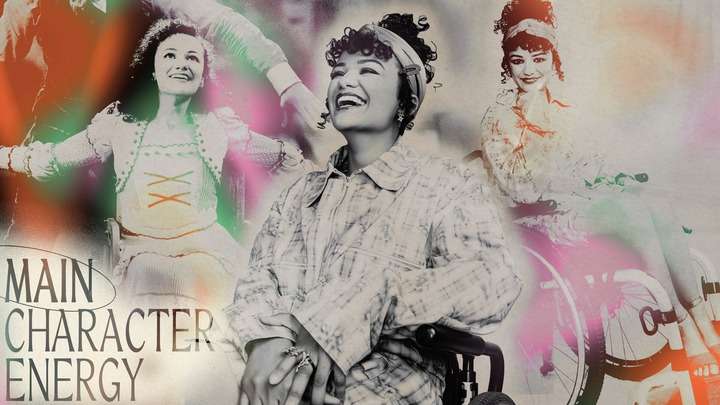Wicked: Star Marissa Bode Says Nessarose Will Get Some Healthy Changes in Wicked: Part 2
Sami Drasin for Universal Pictures/Treatment by Liz Coulbourn
Name: Marissa Bode
Hometown: Mazomanie, Wisconsin
Current role: Nessarose in Wicked
Teen Vogue: If you could be the main character in any TV show or movie that’s not your own, who would you be and why?
Marissa Bode: “I’m gonna say Graham in But I’m a Cheerleader because one, it’s my favorite movie of all time. And two, I just love the fun like, “not like other girls” girls characters. Even if, obviously, I’m all for being like other girls. Other girls are amazing, but I like edgy alt characters like that. Also, she’s an iconic lesbian in that movie.”
Marissa Bode remembers the day they shot a pivotal scene for her character Nessarose in Jon M. Chu’s Wicked movie, when Nessa’s sister Elphaba (Cynthia Erivo) launches her into the air. Their father insists on Elphaba accompanying Nessa to her dorm, something Nessa is able to and wishes to do on her own. But when people start to crowd and put their hands on Nessa’s wheelchair against her will, Elphaba goes into protective big sister mode and accidentally uses her powers to send Nessa and her wheelchair flying.
“They showed me on my stunt double what it would look like, making sure I was okay with it, making sure I was comfortable, and I said, ‘Put me in immediately,’ because I knew it was going to be fun,” Bode tells Teen Vogue. Both she and her wheelchair had to be rigged up in separate harnesses as they were launched into the air high above her Shiz classmates. Her chair was modeled after her chair in real life and designed to replicate that Ozian aesthetic that makes it feel cohesive with the whimsical set. “My character isn’t supposed to be having fun, and so it was a balance of really acting and making sure that I didn’t look like I was having as much fun as I actually was.”
Bode is the first authentic wheelchair user to portray the role of Nessarose in Wicked, and it’s also Bode’s first appearance on the big screen. The 24-year-old actress, who is from a small town in Wisconsin, felt excited taking on the role, which has historically been played solely by non-disabled actors.
L to R: Marissa Bode is Nessarose and Cynthia Erivo is Elphaba in WICKED, directed by Jon M. Chu.
Wicked has been captivating audiences since its original Broadway debut in 2003. In the story, based on the 1995 novel by Gregory Maguire, Nessa uses a wheelchair due to complications involving her mother eating milk flowers while pregnant in order to avoid giving Nessa her sister’s green complexion. She’s looking for a fresh start and longing to fit in alongside her peers during her first year at the magical university Shiz. Being in a wheelchair is the least of Nessa’s concerns. The real challenges are having a helicopter father who doesn’t think she is capable of doing anything on her own, navigating romantic feelings for a boy who shows interest in her for the first time, and trying to fit in when Elphaba embarrasses her in front of the entire school on the first day.
Something that isn’t a challenge for Nessarose, or Bode, is navigating the city of Oz from a wheelchair. Access coordinator Chantelle Nassari, who also uses a wheelchair, and director Jon M. Chu made sure that every aspect of Oz — from the set design to the cast trailers — was comfortable and accessible to all cast members. Everything was adapted. It was very, as they would say in Oz, accessibilifidical. “Jon himself was really good with checking in with me and making sure that I felt comfortable in terms of movement,” Bode says. “He was just really good at asking instead of just assuming and making sure that I moved comfortably through a set.”
Bode felt most connected to Nessa during the scene where she is getting dropped off at school, where well-intentioned strangers try to be helpful in the worst way possible. “I think one point that I really like that they emphasized in this and highlighted that I know irks me to my core as a disabled person, is the idea of not consenting to people touching you and touching your mobility devices,” Bode says. “Hence Miss Coddle not fully listening, and Keala [Settle] did an incredible job at just playing the most over the top person who thinks that they’re helping but they’re not really, and they’re not listening. Because I have related to that way too many times.”
Bode hopes the disabled audience feels seen and has a little relatable giggle — and that non-disabled people see just how frustrating this experience can be. In the U.S. today, nearly 1 in 4 people has some kind of a disability, yet on screen only about 3.1% of characters are depicted as having a disability. Of that small percentage, less than 5% of disabled characters are cast to actors actually having a disability, meaning often non-disabled people are playing those characters on screen.
Wicked has been adored far and wide, but Nessarose’s character has not always been a fan favorite in the disabled community. Some argue that Nessa’s disability is something that makes her bitter and vengeful, which is a harmful stereotype that has been repeated in media throughout history. In the second half of the show there is a scene where Elphaba makes Nessarose walk with some enchanted shoes. Walking makes her feel powerful, suggesting that her worth and power is only validated when she has the ability to walk. Many disabled people feel this reduces her disability to a plot device and doesn’t create a fully developed character they can relate to.
Meanwhile, Nessa has always been played by a non-disabled person, so there wasn’t anyone to give a genuine voice to disabled audience members. For wheelchair users, our wheelchairs are just how we get around, it doesn’t make our lives tragic or our stories sad, it actually makes our stories possible and our world reachable.
A few weeks ago, Bode had dinner with her cast alongside writer Winnie Holzman, who wrote the original Wicked for the stage and adapted it to the screen version. They were able to discuss concerns that the disabled community had about the original portrayal of Nessa in the stage version. “She was telling me how she heard some of the pushback from the disabled community and she wanted to get it right without necessarily changing the entire story of the musical,” Bode says, adding that Holzman sat down with her friend who uses a wheelchair in creating those changes to make sure they were done respectfully.
Sami Drasin for Universal Pictures
Although Bode can’t say much about what will happen in Wicked Part 2, which comes out in November 2025, she does say that “there will be movie magic and just magic in general, but just not in the way that I think a lot of people think it might be. There have been changes that I think are great in terms of representation in a healthy way, but I don’t think I can say more than that.”
Bode hopes this production creates changes in the industry as a whole that are long overdue. “I hope disabled people can feel more seen and less alone because I didn’t grow up with this, I didn’t grow up with a lot of disability representation,” she says. “And if it was, it was for one special episode and never to be seen again.”
Following her positive experience with Universal, she hopes to see other major productions following suit and a rise in the number of authentic disabled characters on screen. Not just having disabled characters but also creating an environment where they are included in every other way on set. “It’s never special treatment, it’s literally meeting them where they need to be met,” says Bode. She hopes to encourage other disabled actors never to feel like they’re asking a lot for needing things like an accessible bathroom on set.
“Advocate for yourself, you’re never asking for too much.”






